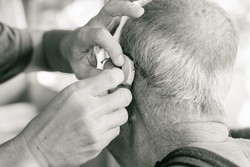Hearing loss in the EU’s elderly
With the retirement of the baby boomer generation, elderly people comprise a large and growing proportion of Europe’s population. The EU aims to keep its senior citizens as healthy and active as possible, yet hearing loss is both a cause and sign of growing disability. The EU-funded AHEAD III (Assessment of hearing in the elderly: Aging and degeneration - Integration through immediate intervention) project examined the issue of hearing loss. The team studied the effects of such loss, ways of increasing public awareness about early detection and intervention, and the costs of large-scale screening. The consortium detailed the minimum screening requirements and diagnostic methods, and provided recommendations for successful implementation using the options available. The group also set new criteria for newly proposed technologies, and analysed protocols to be tuned to each European country or region in question. One of the project’s main achievements was a comprehensive review of the prevalence of ARHL in Europe. The review addressed more than 1 000 sources. Additionally, in conjunction with the German Seniors League, the team implemented a two-stage ARHL campaign in Germany and Europe’s other German-speaking countries. A second review addressed mechanisms for hearing loss and the potential for interaction with other health conditions. Additional reviews discussed old and new screening methods and intervention following hearing loss. As a result, the team implemented in Wales a pilot for a new hearing loss screening concept. Following the evaluation of results, and release of a position statement, AHEAD III first proceeded to further trials in Italy and Cyprus. A second phase of screening went ahead in Belgium, Germany and Malta. The team also established contact with ARHL screening programmes in the United States. During 2010, the project organised an international conference concerning screening for adult hearing loss. Other dissemination activities included numerous radio and television appearances, several newspaper articles and leaflet advertising of the screening campaigns. The work yielded 12 scientific papers, plus 36 conference presentations. As a result of AHEAD III, Europe will be better placed to implement and evaluate ARHL screening. Thus, Europeans may expect a higher quality of life in old age.
Keywords
Hearing loss, elderly, age-related hearing loss, disability, AHEAD III, degeneration



